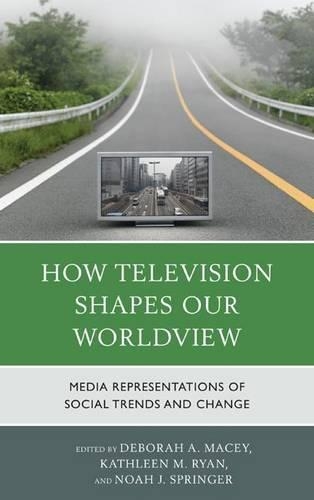
How Television Shapes Our Worldview: Media Representations of Social Trends and Change
(Paperback)
Available Formats
Publishing Details
How Television Shapes Our Worldview: Media Representations of Social Trends and Change
By (Author) Deborah A. Macey
Edited by Kathleen M. Ryan
Edited by Noah J. Springer
Contributions by Styls I. Akira
Contributions by Lane Clegg
Contributions by Cindy Conaway
Contributions by Katherine A. Foss
Contributions by Charity Fox
Contributions by Carrie Packwood Freeman
Contributions by Jennifer Ellen Good
Bloomsbury Publishing PLC
Lexington Books
29th February 2016
United States
Classifications
Tertiary Education
Non Fiction
302.2345
Physical Properties
Paperback
462
Width 154mm, Height 229mm, Spine 33mm
676g
Description
Over the last half of the twentieth century, television has become the predominant medium through which the public accesses information about the world. Through the news, situation comedies, police dramas, and commercials, we learn about the world around us, and our role within it. These genres, narratives, and cultural forms are not simply entertainment, but powerful socializing agents that show the world as we might never see it in real life. How Television Shapes Our Worldview brings together a diverse set of scholars, methodologies, and theoretical frameworks to interrogate the ways through which television molds our vision of the outside world. The essays include advertising and public relations analyses, audience interviews, and case studies that touch on genres ranging from science fiction in the 1970s to current reality television. Television truly provides a powerful influence over how we learn about the world around us and understand its social processes.
Reviews
The authors use diverse methodologies, theoretical frameworks, and genres of television to enhance the scholarly application of this book. The editors succeeded in organizing an array of essays on the ways in which television both influences and is influenced by social trends.... This book would be a helpful addition to a course on mass media, the history of television, or diversity in the media... The variety of methods and theoretical frameworks used make the book helpful for a class that is exploring ways to approach the study of media and communication. * International Journal of Communication *
Because of its range of texts, themes, and critical approaches, this potpourri of essays enriches television scholarship. The ambitious collection examines commercial considerations, such as advertising and audience reception, and social issues, such as images of good and evil. It is a persuasive analysis of information distribution and predictions about what lies ahead in television, which remains a singularly important conduit for dominant and alternative cultural narratives. -- Jan Whitt, University of Colorado Boulder
This book brings together diverse and highly respected scholars to help demonstrate the powerful influence of television, an increasingly fragmented and fractured media in contemporary culture. It explores institutions, audiences, and cultures through multiple methodologies and theoretical frameworks, offering fascinating new insights into how television molds our perceptions of the world and influences our action within it. -- Kathleen German, Miami University
Author Bio
Deborah A. Macey is visiting assistant professor at Saint Louis University. Kathleen M. Ryan is an associate professor at the University of Colorado, Boulder and an active multimedia director and producer. Noah J. Springer is a PhD student at the University of Colorado, Boulder.
